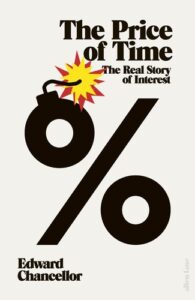Review: The Price of Time, Edward Chancellor, Penguin, ISBN: 9781802060157, Pages 432

I am a big fan of the Chancellor’s first foray in financial history. In 1999, Chancellor published Devil Take the Hindmost: A History of Financial Speculation, which made the long-list of the New York Times Notable Book of the Year. To me, it was and still is one of the best written descriptions of financial manias, better than Kindleberger’s Manias, Panics, and Crashes. Given my previous experience, I picked up Price of Time with a lot of enthusiasm but left with mixed feelings.
The problem starts with the book’s title itself. The subtitle says – “Real Story of Interest.” Unfortunately, this is a misnomer. The story of interest (rates) is just one-fourth of the book, the rest of the book is the author’s unhappiness about low-interest rates. The book’s first part, which is the story/history part, is masterfully drawn, starting from Egyptian and Sumerian civilizations to our current times. What I find interesting here is that the discussion on appropriate interest rates has been going on for all practical purposes since the dawn of time. It is not that the current breed of economists has become any wiser or more insightful than the earlier ones despite all the sophisticated mathematics and data collection. If anything, historical arguments and counterarguments for low-interest rates (which is really what the book is about) were much more direct and easier to understand than they are made out to be now.
The second part is where things disappoint. Firstly, the book is about criticism of low-interest rates, close to two hundred pages are devoted to that, but the title doesn’t mention this. Secondly, the topic is stale more than a decade into the low-interest rate regime. This is also clear from the way the text is written here. The text is mainly about quoting various authorities in the subject matter instead of new original inputs. The author rightly presents ills of low rates – inequality, pension shortfalls, leverage etc. The text is full of quotes from Hayek, Schumpeter, Mises, Marx, Bernanke etc., this list keeps going. But this is what the live news has been about for a decade.
Also, linking everything to a low-interest rate is an overkill. Corporate scandals will happen irrespective of interest rates. As for innovation, one can also argue that low-interest rates allow the private sector to fund innovation which may take time to fructify. Earlier, this area only received university and government grants. Developing economies have managed to get some financing thanks to low rates. Providing a one-sided view doesn’t do justice to a multi-faceted problem. I am sure there is reason millions of lower and middle-income people have not gone in revolt against low-interest rates.
After highlighting so many ills, the book has little to offer on alternatives besides grandfatherly statements. If nothing else, maybe we could have been given an example of an economy that has never had boom and bust cycles and has been growing for decades, if not centuries. Unfortunately, we all know such an example cannot be provided.


